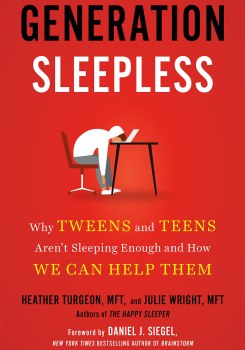Teenagers Need More Sleep—And They’re Not Getting It
Getting enough sleep is vital for healthy brain development for teens. But outside societal factors prevent this from happening.
The following is an excerpt from Generation Sleepless: Why Tweens and Teens Aren’t Sleeping Enough and How We Can Help Them, by Heather Turgeon and Julie Wright.
Disclaimer: When you purchase products through the Bookshop.org link on this page, Science Friday may earn a small commission which helps support our journalism.

Generation Sleepless: Why Tweens and Teens Aren't Sleeping Enough and How We Can Help Them
What if you knew that one simple daily habit would boost your teenager’s mental health threefold, improve their grades and love of school, make them a better athlete, dramatically reduce their stress and anxiety, cut their chances of getting in a car accident in half, and ward off chronic health conditions like type 2 diabetes, obesity, and cancer? And what if this practice cost nothing and was completely natural? No downsides—only upsides to everything you care about in your teenager’s life.
Of course you’d start today.
The irony is that we have this powerful panacea available to us at this very moment, and every day we systematically neglect it. Yes, you’ve guessed it. It’s the life-fueling practice of sleep—and our teenagers are in the midst of the worst case of deprivation experienced by any population in history.
Modern-day teens are the most sleep-deprived group of any individuals the world has ever seen: while the majority of elementary school kids get the optimal amount of sleep on most nights, that number drops to about 30% by middle school, and by their senior year, only 5=% of teens get optimal sleep on school nights. And the numbers keep slipping. In 2015, 58% more teenagers were severely sleep deprived than in 1991. A recent survey of 60,000 American high school students measured how well teens are faring in terms of basic health recommendations for sleep, screen use, and exercise. Only 3% of girls and 7% of boys reached these targets.
As therapists and sleep specialists, we’ve watched this downward trend in teen sleep. A “perfect storm” (a concept we’ll explore throughout this book) of shifting biology, academic pressure, early high school start times, and a misconception that sleep is dispensable rather than essential has been steadily chipping away at teen sleep. But while that storm has been brewing for decades, the explosion of technology has taken this storm to Category 5 hurricane levels. The smartphone is getting harder and harder to put down. Technology is ever more brilliant at keeping teens engaged and connected (teen sleep took a notable dip after 2011 as the smartphone gained popularity). Meanwhile, the academic load on students continues to increase and kids are being prepped for college applications when they’ve barely stopped playing tag on the playground. Like never before, teens’ sleep is being stolen from all sides.
Invest in quality science journalism by making a donation to Science Friday.
To make matters worse, adolescence is a stage of life when proper sleep is vital and game changing—to a degree that few of us fully appreciate. Books on baby sleep are stacked high on our bedside tables, because no one doubts the importance of sleep to a growing baby. But the truth is, a teenager’s brain is going through an equally important stage of growth (with potentially more life-altering and consequential outcomes). Adolescence is an awe-inspiring and pivotal developmental phase, when the brain undergoes massive reorganization and growth, and much of that vital work happens during sleep. Missing sleep raises the risk of mental health issues, heightens teen stress at a neurochemical level, makes athletes more accident prone, and causes the brain’s memory storage to malfunction, which short-circuits learning and academic success. When sleep is missing, the ripple effects on mental and physical health are tremendous and exponential.
Even when we as parents try to protect sleep, we often feel like our hands are tied. Yes, most of us know our teen should get to bed on time, but many of us feel frustrated and powerless because the factors that truly limit sleep—insidious technology, academic overload, and in some cases punishingly early high school start times—feel out of our control. What can we possibly do? (Who’s up for joining us in breaking into the headquarters of Big Tech to change the algorithms that create increasingly addictive platforms and games? Or magically signing a bill to make middle and high schools across the world start no earlier than 8:30 a.m.?) In all seriousness, what are parents, teens, and the people who care about them supposed to do to protect growing teenage brains and bodies?
From Generation Sleepless by Heather Turgeon MFT and Julie Wright MFT, published by TarcherPerigee, an imprint of Penguin Publishing Group, a division of Penguin Random House, LLC. Copyright © 2022 by Heather Turgeon and Julie Wright.
Heather Turgeon is a psychotherapist and sleep specialist based in Los Angeles, California, and the co-author of Generation Sleepless: Why Teens and Tweens Are Not Sleeping Enough And What We Can Do To Help Them.
Julie Wright is a psychotherapist and sleep specialist based in Los Angeles, California, and the co-author of Generation Sleepless: Why Teens and Tweens Are Not Sleeping Enough And What We Can Do To Help Them.